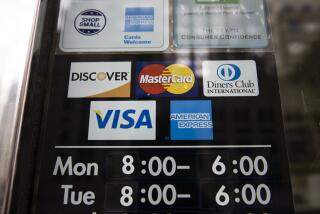Card Issuer First USA Signals End to the Interest Rate War
- Share via
Falling profit at First USA, one of the nation’s leading low-rate credit card issuers, could trigger a slowdown in the industry’s raging interest rate war, much to the disappointment of consumers who have been the primary benefactors of the competition.
First USA raised a white flag of sorts Wednesday, saying its aggressive strategy of winning customers by offering low interest rates--including one card that offers a permanent rate of 7.99%--was cutting into earnings.
As a result, the nation’s No. 2 credit card issuer said rate hikes are on the horizon for new and existing customers.
“We think we can raise rates, still be below the industry [average], but have a better contribution to [our profit] margin,” First USA Chairman Richard Vague said in a conference call Wednesday.
Vague said First USA has already raised rates on new credit card offers and will begin boosting them for some existing cardholders later this year. But at the same time, rate cuts will be offered to some of the company’s best customers, he added.
In light of the changes at First USA, which has long been the industry leader in offering super-low interest rates on a national level, rival credit card issuers are likely to reexamine their pricing, analysts predicted.
“It’s a watershed event,” said Robert McKinley, president of CardWeb, a Frederick, Md.-based credit card analyst. “When the No. 2 player says: ‘Enough is enough. We’re not able to achieve our numbers,’ you are going to see a short-term retrenchment in the offers from other companies. It’s bad news for consumers.”
Since the interest rate battle began four years ago, average fixed rates on card balances have plummeted from 18% to 13% this year, according to Bankrate.com, a Florida-based research firm. Introductory rates, also known as “teaser” rates, have fallen from an average of 5.9% last year to 2.9% today.
First USA accounts for nearly half the profit of its parent, Chicago-based Bank One Corp., which announced late Tuesday that problems at its credit card unit would cause 1999 earnings to fall 8% below what analysts were expecting. The news sent Bank One’s stock tumbling 23% on Wednesday to $43 a share, down $12.63 in New York Stock Exchange trading.
“This shows that walking a tightrope on interest rates is a dicey game,” said Bruce Brittain, head of Atlanta-based Brittain Associates, an industry consulting firm. “I’m sure it will scare the bejesus out of everyone else. You can bet that chief executives at other credit card companies are on the phone today to make sure the same thing doesn’t happen to them.”
Brittain agreed that First USA’s stumble would spur other companies to step back from aggressive interest rate cutting. “My crystal ball says rates are going up, particularly with the Federal Reserve raising the discount rate this week,” Brittain said.
In addition to the pricing issues, First USA is also suffering from increased industry competition, market saturation and some highly publicized problems with its customer service. The company lost some of its best customers recently after it tightened its policy on assessing late-payment fees, leading many cardholders to complain they were unjustly charged. Cardholders have also accused the company of using bait-and-switch tactics, promising low rates and later hiking them.
First USA officials said they have reversed the unpopular late-payment policy and vowed to work harder to keep cardholders happy.
Officials declined to provide specifics about how much interest rates may rise or how many customers might be affected.
Analysts said one casualty of First USA’s re-pricing program could be its 7.99% permanent-rate card, which the company quietly began testing earlier this year. Even before this week’s announcement, First USA officials had raised questions about the viability of that program.
On Wednesday, other credit card issuers tried to distance themselves from First USA’s troubles. MBNA, the nation’s third-largest issuer, circulated a statement saying it foresees no slowdown in profits.
Despite the reassurances, Wall Street punished several credit card stocks Wednesday. MBNA fell about 6% to $28.13 a share, down $1.94. Capital One Financial lost about 7%, closing down $3.31 at $43.38, and Providian Financial slipped 4%, or $3.94, to $87.50.
More to Read
Inside the business of entertainment
The Wide Shot brings you news, analysis and insights on everything from streaming wars to production — and what it all means for the future.
You may occasionally receive promotional content from the Los Angeles Times.









